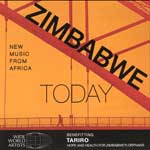Zimbabwe Today is an unusual compilation of music by young, contemporary artists from a country that was once a powerhouse of African music on the international scene. The days when world music media bubbled with the latest news about acts like Thomas Mapfumo, The Bhundu Boys, Oliver Mtukudzi, Stella Chiweshe, Black Umfolosi, and the Four Brothers are a distant memory now. For more than a decade, Zimbabwe has been sliding into poverty and chaos. Many great musicians have died, gone into exile, or been laid low by a devastated music market, and it has been nearly impossible for new Zimbabwean acts to break onto the international scene. This compilation affirms that the talent and inspiration are still there, and there is hope for a Zimbabwean musical renaissance one day.
These songs are filled with an understandable undertone of melancholy and an impressive sheen of resilience. The opener by a group called Hope intertwines mbira music with acoustic guitar and richly harmonized vocals that feel right out of gospel music—an evocative convergence of spiritual energies that says a lot about this country’s unique blend of indigenous and adapted faiths. The song’s title, “The Land,” is provocative given all the heat generated by the land reform issue in Zimbabwe. But with no translation of the Shona lyrics, we are left to wonder whether anything profound is being said about that history here.
Alexio’s electro-acoustic pop song “Shaina” follows with a strong, sweet vocal. Apparently this song was a number-one hit in Zimbabwe for months, and that underscores a cultural challenge for Zimbabwean current music; this sort of quasi R&B number resonates strongly with local audiences, but it is apt to sound recycled and somewhat generic to foreign ears. The same can be said about the canned rock guitar solos that mar a few of these songs. Plugging into a fuzz-box and lamely channeling Santana riffs will never prick up ears around the world the way the inventive, traditionally-derived guitar inventions of older Zim-pop did.
Far more satisfying is Bongo Love’s “Ndasara Ndega,” an imaginative blend of lively marimba, subtle guitar, flute, harmonica and a killer vocal hook. The groove is a restless tumble of rhythm that combines traditional and popular musical ideas in a highly original way—what the best Afropop is all about. “Mhembwe Rudzi” by Selmor Mtukudzi (Oliver’s daughter) also stands out. The music here clearly owes a debt to the Tuku sound, but it has some fresh twists, and Selmor’s voice is robust and engaging—definitely an artist to watch.
Willis Wataffi comes through with a new take on classic Zimbabwean pop on “Arumwa.” Excellent singing and drumming and sweet guitar interplay, balanced with keyboards adds up to a terrific mix. “Anopoda” by Tendai Manatsa (son of the 70s star Zexie Manatsa) also re-jiggers old formulas to good effect—centered around Tendai’s robust, reedy lead vocal. There are two strong reggae tracks sung in English. “Lord If I Cry” by Transit Crew is particularly affecting with its prayerful lyrics and rootsy production style. “Der Pon” by Mathias Julius also has a great sound, but the lyrical focus on “slavery” and “Zion” and “being taken (overseas) to the Queen,” feels a little anachronistic given the immediate circumstances of suffering in Zimbabwe. One line, “We were told we would be free,” suggests a glimmer of present day relevance, but if that is the intent, it is entirely too well disguised behind standard reggae rhetoric.
This points to the one major shortcoming of this otherwise excellent and long overdue collection. It tells us nothing about who these artists are or what they are singing about. This complete absence of detailed context does not well serve an “introduction.” After all, Zimbabwe’s earlier wave of stars was not made only with great music, but also with vivid and compelling stories. After the silence we’ve heard from Zimbabwe over the past 10 years or more, we yearn to know what artists are singing and audiences responding to. Given the oppressive political environment and well-documented instances of government censorship, we can hardly expect the modern day equivalent of 1970s chimurenga songs. But even basic biographies of the artists would help. Some information on these artists can be found at http://www.wideworldartists.com/Artists.html.
This is nevertheless a welcome missive from Zimbabwe. No translation is needed to convey the fact that this remains a country of fabulous singers and songwriters, powerful traditions, musical ingenuity and above all, moral stamina. Listening to this, one can actually feel that better days lie ahead for Zimbabwe.
-Banning Eyre








